Literature Review on Leadership's Importance in Managing Teams
VerifiedAdded on 2023/01/11
|7
|2037
|47
Literature Review
AI Summary
This literature review examines the concept of leadership and its significance in managing teams, focusing on the honours degree level. It explores various leadership styles, including participative and transformational approaches, and their impact on team performance and member engagement. The review synthesizes perspectives from multiple authors, highlighting the importance of leadership in setting direction, fostering relationships, and achieving organizational objectives. It also delves into the benefits of effective leadership, such as improved communication, increased productivity, and enhanced team morale, while also addressing challenges like conflict resolution. The conclusion emphasizes the critical role of strong leadership skills in achieving success, both professionally and personally.
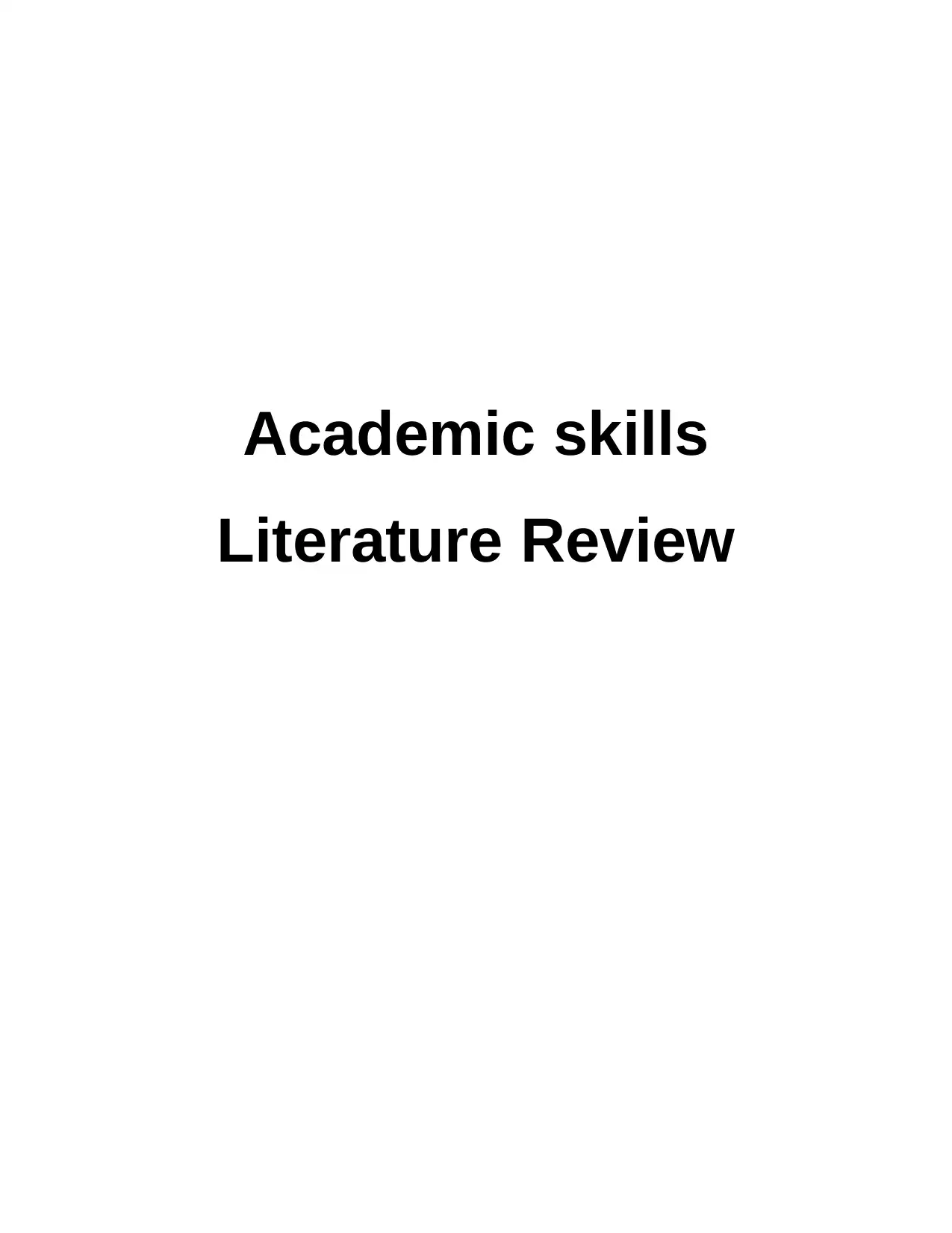
Academic skills
Literature Review
Literature Review
Paraphrase This Document
Need a fresh take? Get an instant paraphrase of this document with our AI Paraphraser
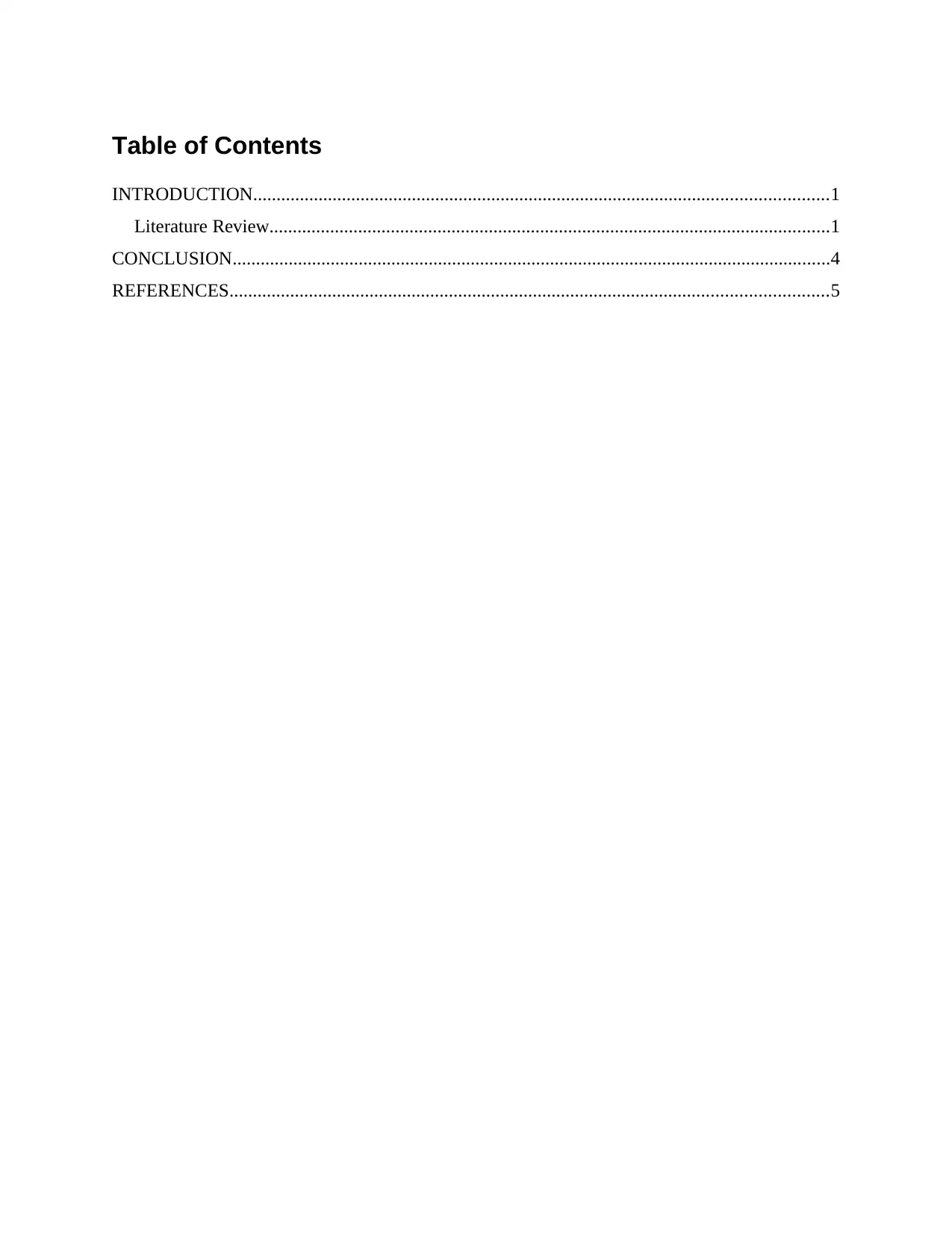
Table of Contents
INTRODUCTION...........................................................................................................................1
Literature Review........................................................................................................................1
CONCLUSION................................................................................................................................4
REFERENCES................................................................................................................................5
INTRODUCTION...........................................................................................................................1
Literature Review........................................................................................................................1
CONCLUSION................................................................................................................................4
REFERENCES................................................................................................................................5
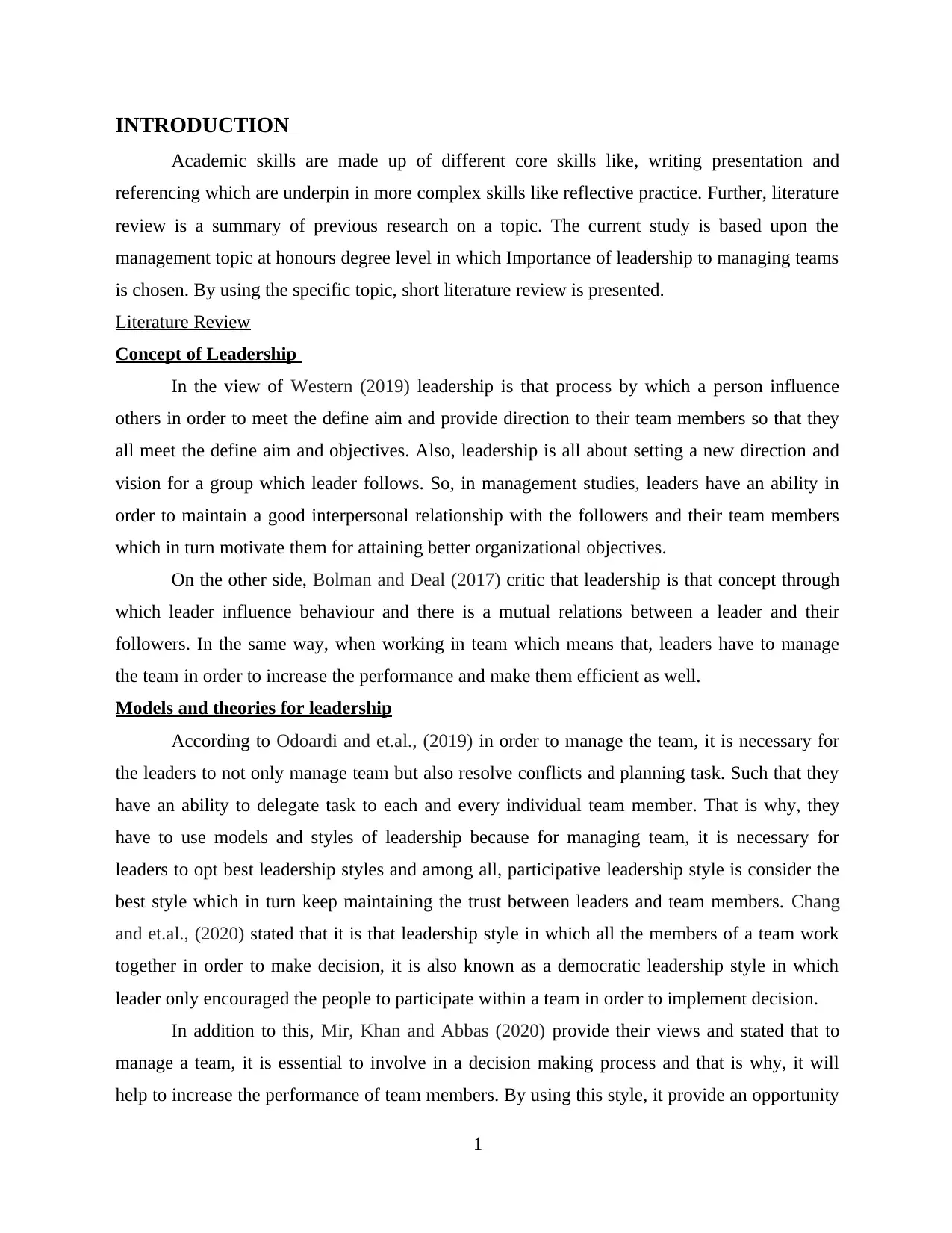
INTRODUCTION
Academic skills are made up of different core skills like, writing presentation and
referencing which are underpin in more complex skills like reflective practice. Further, literature
review is a summary of previous research on a topic. The current study is based upon the
management topic at honours degree level in which Importance of leadership to managing teams
is chosen. By using the specific topic, short literature review is presented.
Literature Review
Concept of Leadership
In the view of Western (2019) leadership is that process by which a person influence
others in order to meet the define aim and provide direction to their team members so that they
all meet the define aim and objectives. Also, leadership is all about setting a new direction and
vision for a group which leader follows. So, in management studies, leaders have an ability in
order to maintain a good interpersonal relationship with the followers and their team members
which in turn motivate them for attaining better organizational objectives.
On the other side, Bolman and Deal (2017) critic that leadership is that concept through
which leader influence behaviour and there is a mutual relations between a leader and their
followers. In the same way, when working in team which means that, leaders have to manage
the team in order to increase the performance and make them efficient as well.
Models and theories for leadership
According to Odoardi and et.al., (2019) in order to manage the team, it is necessary for
the leaders to not only manage team but also resolve conflicts and planning task. Such that they
have an ability to delegate task to each and every individual team member. That is why, they
have to use models and styles of leadership because for managing team, it is necessary for
leaders to opt best leadership styles and among all, participative leadership style is consider the
best style which in turn keep maintaining the trust between leaders and team members. Chang
and et.al., (2020) stated that it is that leadership style in which all the members of a team work
together in order to make decision, it is also known as a democratic leadership style in which
leader only encouraged the people to participate within a team in order to implement decision.
In addition to this, Mir, Khan and Abbas (2020) provide their views and stated that to
manage a team, it is essential to involve in a decision making process and that is why, it will
help to increase the performance of team members. By using this style, it provide an opportunity
1
Academic skills are made up of different core skills like, writing presentation and
referencing which are underpin in more complex skills like reflective practice. Further, literature
review is a summary of previous research on a topic. The current study is based upon the
management topic at honours degree level in which Importance of leadership to managing teams
is chosen. By using the specific topic, short literature review is presented.
Literature Review
Concept of Leadership
In the view of Western (2019) leadership is that process by which a person influence
others in order to meet the define aim and provide direction to their team members so that they
all meet the define aim and objectives. Also, leadership is all about setting a new direction and
vision for a group which leader follows. So, in management studies, leaders have an ability in
order to maintain a good interpersonal relationship with the followers and their team members
which in turn motivate them for attaining better organizational objectives.
On the other side, Bolman and Deal (2017) critic that leadership is that concept through
which leader influence behaviour and there is a mutual relations between a leader and their
followers. In the same way, when working in team which means that, leaders have to manage
the team in order to increase the performance and make them efficient as well.
Models and theories for leadership
According to Odoardi and et.al., (2019) in order to manage the team, it is necessary for
the leaders to not only manage team but also resolve conflicts and planning task. Such that they
have an ability to delegate task to each and every individual team member. That is why, they
have to use models and styles of leadership because for managing team, it is necessary for
leaders to opt best leadership styles and among all, participative leadership style is consider the
best style which in turn keep maintaining the trust between leaders and team members. Chang
and et.al., (2020) stated that it is that leadership style in which all the members of a team work
together in order to make decision, it is also known as a democratic leadership style in which
leader only encouraged the people to participate within a team in order to implement decision.
In addition to this, Mir, Khan and Abbas (2020) provide their views and stated that to
manage a team, it is essential to involve in a decision making process and that is why, it will
help to increase the performance of team members. By using this style, it provide an opportunity
1
⊘ This is a preview!⊘
Do you want full access?
Subscribe today to unlock all pages.

Trusted by 1+ million students worldwide
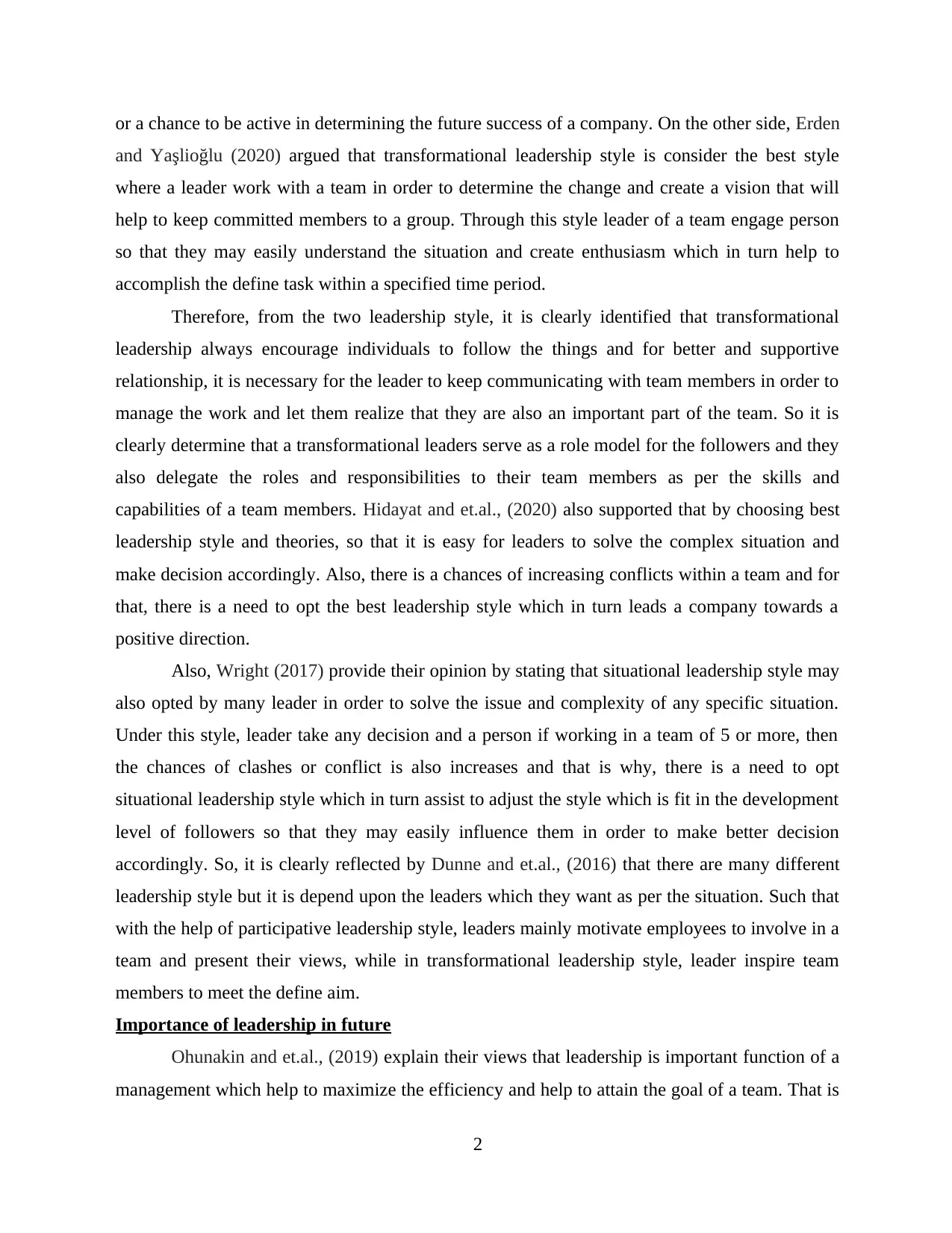
or a chance to be active in determining the future success of a company. On the other side, Erden
and Yaşlioğlu (2020) argued that transformational leadership style is consider the best style
where a leader work with a team in order to determine the change and create a vision that will
help to keep committed members to a group. Through this style leader of a team engage person
so that they may easily understand the situation and create enthusiasm which in turn help to
accomplish the define task within a specified time period.
Therefore, from the two leadership style, it is clearly identified that transformational
leadership always encourage individuals to follow the things and for better and supportive
relationship, it is necessary for the leader to keep communicating with team members in order to
manage the work and let them realize that they are also an important part of the team. So it is
clearly determine that a transformational leaders serve as a role model for the followers and they
also delegate the roles and responsibilities to their team members as per the skills and
capabilities of a team members. Hidayat and et.al., (2020) also supported that by choosing best
leadership style and theories, so that it is easy for leaders to solve the complex situation and
make decision accordingly. Also, there is a chances of increasing conflicts within a team and for
that, there is a need to opt the best leadership style which in turn leads a company towards a
positive direction.
Also, Wright (2017) provide their opinion by stating that situational leadership style may
also opted by many leader in order to solve the issue and complexity of any specific situation.
Under this style, leader take any decision and a person if working in a team of 5 or more, then
the chances of clashes or conflict is also increases and that is why, there is a need to opt
situational leadership style which in turn assist to adjust the style which is fit in the development
level of followers so that they may easily influence them in order to make better decision
accordingly. So, it is clearly reflected by Dunne and et.al., (2016) that there are many different
leadership style but it is depend upon the leaders which they want as per the situation. Such that
with the help of participative leadership style, leaders mainly motivate employees to involve in a
team and present their views, while in transformational leadership style, leader inspire team
members to meet the define aim.
Importance of leadership in future
Ohunakin and et.al., (2019) explain their views that leadership is important function of a
management which help to maximize the efficiency and help to attain the goal of a team. That is
2
and Yaşlioğlu (2020) argued that transformational leadership style is consider the best style
where a leader work with a team in order to determine the change and create a vision that will
help to keep committed members to a group. Through this style leader of a team engage person
so that they may easily understand the situation and create enthusiasm which in turn help to
accomplish the define task within a specified time period.
Therefore, from the two leadership style, it is clearly identified that transformational
leadership always encourage individuals to follow the things and for better and supportive
relationship, it is necessary for the leader to keep communicating with team members in order to
manage the work and let them realize that they are also an important part of the team. So it is
clearly determine that a transformational leaders serve as a role model for the followers and they
also delegate the roles and responsibilities to their team members as per the skills and
capabilities of a team members. Hidayat and et.al., (2020) also supported that by choosing best
leadership style and theories, so that it is easy for leaders to solve the complex situation and
make decision accordingly. Also, there is a chances of increasing conflicts within a team and for
that, there is a need to opt the best leadership style which in turn leads a company towards a
positive direction.
Also, Wright (2017) provide their opinion by stating that situational leadership style may
also opted by many leader in order to solve the issue and complexity of any specific situation.
Under this style, leader take any decision and a person if working in a team of 5 or more, then
the chances of clashes or conflict is also increases and that is why, there is a need to opt
situational leadership style which in turn assist to adjust the style which is fit in the development
level of followers so that they may easily influence them in order to make better decision
accordingly. So, it is clearly reflected by Dunne and et.al., (2016) that there are many different
leadership style but it is depend upon the leaders which they want as per the situation. Such that
with the help of participative leadership style, leaders mainly motivate employees to involve in a
team and present their views, while in transformational leadership style, leader inspire team
members to meet the define aim.
Importance of leadership in future
Ohunakin and et.al., (2019) explain their views that leadership is important function of a
management which help to maximize the efficiency and help to attain the goal of a team. That is
2
Paraphrase This Document
Need a fresh take? Get an instant paraphrase of this document with our AI Paraphraser
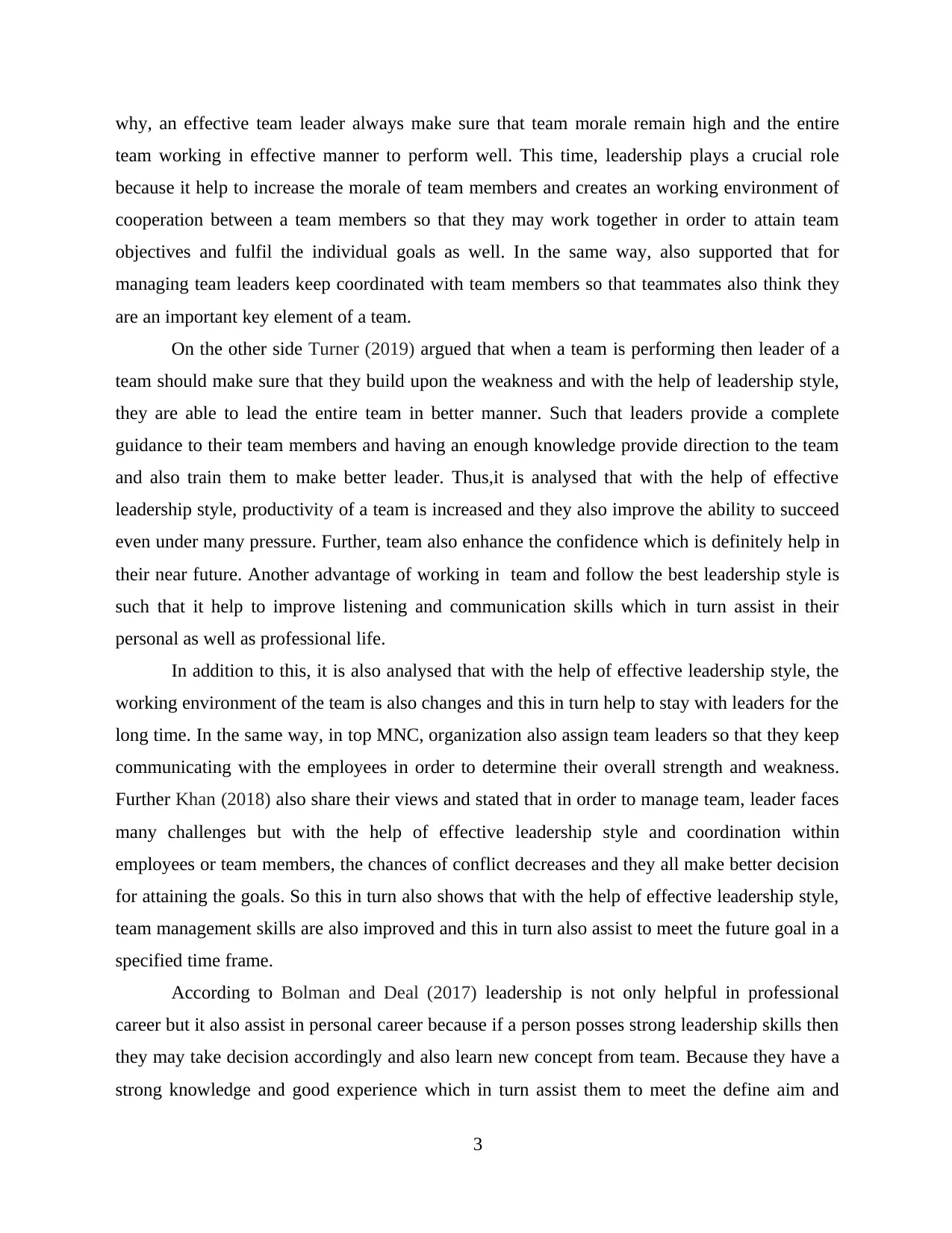
why, an effective team leader always make sure that team morale remain high and the entire
team working in effective manner to perform well. This time, leadership plays a crucial role
because it help to increase the morale of team members and creates an working environment of
cooperation between a team members so that they may work together in order to attain team
objectives and fulfil the individual goals as well. In the same way, also supported that for
managing team leaders keep coordinated with team members so that teammates also think they
are an important key element of a team.
On the other side Turner (2019) argued that when a team is performing then leader of a
team should make sure that they build upon the weakness and with the help of leadership style,
they are able to lead the entire team in better manner. Such that leaders provide a complete
guidance to their team members and having an enough knowledge provide direction to the team
and also train them to make better leader. Thus,it is analysed that with the help of effective
leadership style, productivity of a team is increased and they also improve the ability to succeed
even under many pressure. Further, team also enhance the confidence which is definitely help in
their near future. Another advantage of working in team and follow the best leadership style is
such that it help to improve listening and communication skills which in turn assist in their
personal as well as professional life.
In addition to this, it is also analysed that with the help of effective leadership style, the
working environment of the team is also changes and this in turn help to stay with leaders for the
long time. In the same way, in top MNC, organization also assign team leaders so that they keep
communicating with the employees in order to determine their overall strength and weakness.
Further Khan (2018) also share their views and stated that in order to manage team, leader faces
many challenges but with the help of effective leadership style and coordination within
employees or team members, the chances of conflict decreases and they all make better decision
for attaining the goals. So this in turn also shows that with the help of effective leadership style,
team management skills are also improved and this in turn also assist to meet the future goal in a
specified time frame.
According to Bolman and Deal (2017) leadership is not only helpful in professional
career but it also assist in personal career because if a person posses strong leadership skills then
they may take decision accordingly and also learn new concept from team. Because they have a
strong knowledge and good experience which in turn assist them to meet the define aim and
3
team working in effective manner to perform well. This time, leadership plays a crucial role
because it help to increase the morale of team members and creates an working environment of
cooperation between a team members so that they may work together in order to attain team
objectives and fulfil the individual goals as well. In the same way, also supported that for
managing team leaders keep coordinated with team members so that teammates also think they
are an important key element of a team.
On the other side Turner (2019) argued that when a team is performing then leader of a
team should make sure that they build upon the weakness and with the help of leadership style,
they are able to lead the entire team in better manner. Such that leaders provide a complete
guidance to their team members and having an enough knowledge provide direction to the team
and also train them to make better leader. Thus,it is analysed that with the help of effective
leadership style, productivity of a team is increased and they also improve the ability to succeed
even under many pressure. Further, team also enhance the confidence which is definitely help in
their near future. Another advantage of working in team and follow the best leadership style is
such that it help to improve listening and communication skills which in turn assist in their
personal as well as professional life.
In addition to this, it is also analysed that with the help of effective leadership style, the
working environment of the team is also changes and this in turn help to stay with leaders for the
long time. In the same way, in top MNC, organization also assign team leaders so that they keep
communicating with the employees in order to determine their overall strength and weakness.
Further Khan (2018) also share their views and stated that in order to manage team, leader faces
many challenges but with the help of effective leadership style and coordination within
employees or team members, the chances of conflict decreases and they all make better decision
for attaining the goals. So this in turn also shows that with the help of effective leadership style,
team management skills are also improved and this in turn also assist to meet the future goal in a
specified time frame.
According to Bolman and Deal (2017) leadership is not only helpful in professional
career but it also assist in personal career because if a person posses strong leadership skills then
they may take decision accordingly and also learn new concept from team. Because they have a
strong knowledge and good experience which in turn assist them to meet the define aim and
3
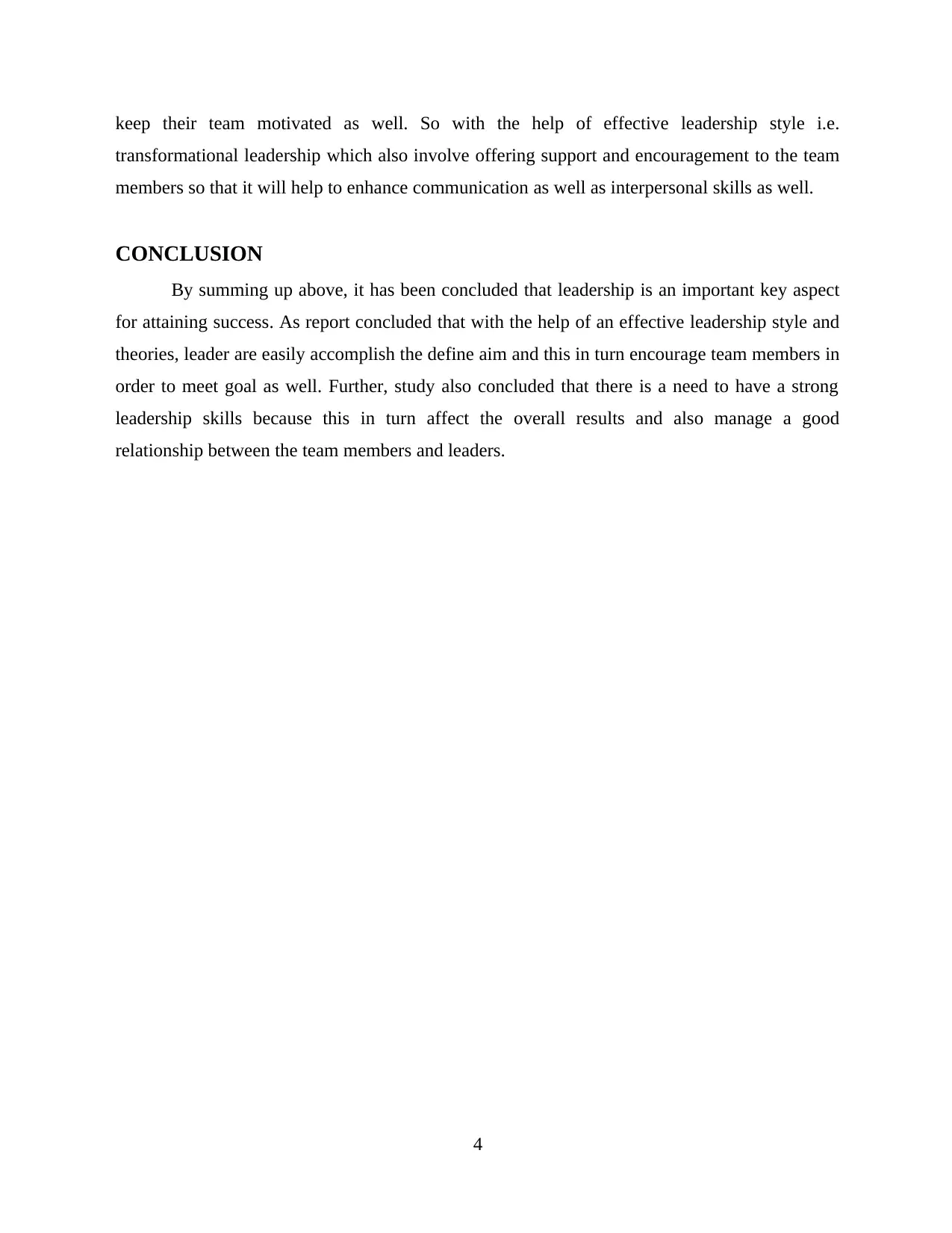
keep their team motivated as well. So with the help of effective leadership style i.e.
transformational leadership which also involve offering support and encouragement to the team
members so that it will help to enhance communication as well as interpersonal skills as well.
CONCLUSION
By summing up above, it has been concluded that leadership is an important key aspect
for attaining success. As report concluded that with the help of an effective leadership style and
theories, leader are easily accomplish the define aim and this in turn encourage team members in
order to meet goal as well. Further, study also concluded that there is a need to have a strong
leadership skills because this in turn affect the overall results and also manage a good
relationship between the team members and leaders.
4
transformational leadership which also involve offering support and encouragement to the team
members so that it will help to enhance communication as well as interpersonal skills as well.
CONCLUSION
By summing up above, it has been concluded that leadership is an important key aspect
for attaining success. As report concluded that with the help of an effective leadership style and
theories, leader are easily accomplish the define aim and this in turn encourage team members in
order to meet goal as well. Further, study also concluded that there is a need to have a strong
leadership skills because this in turn affect the overall results and also manage a good
relationship between the team members and leaders.
4
⊘ This is a preview!⊘
Do you want full access?
Subscribe today to unlock all pages.

Trusted by 1+ million students worldwide
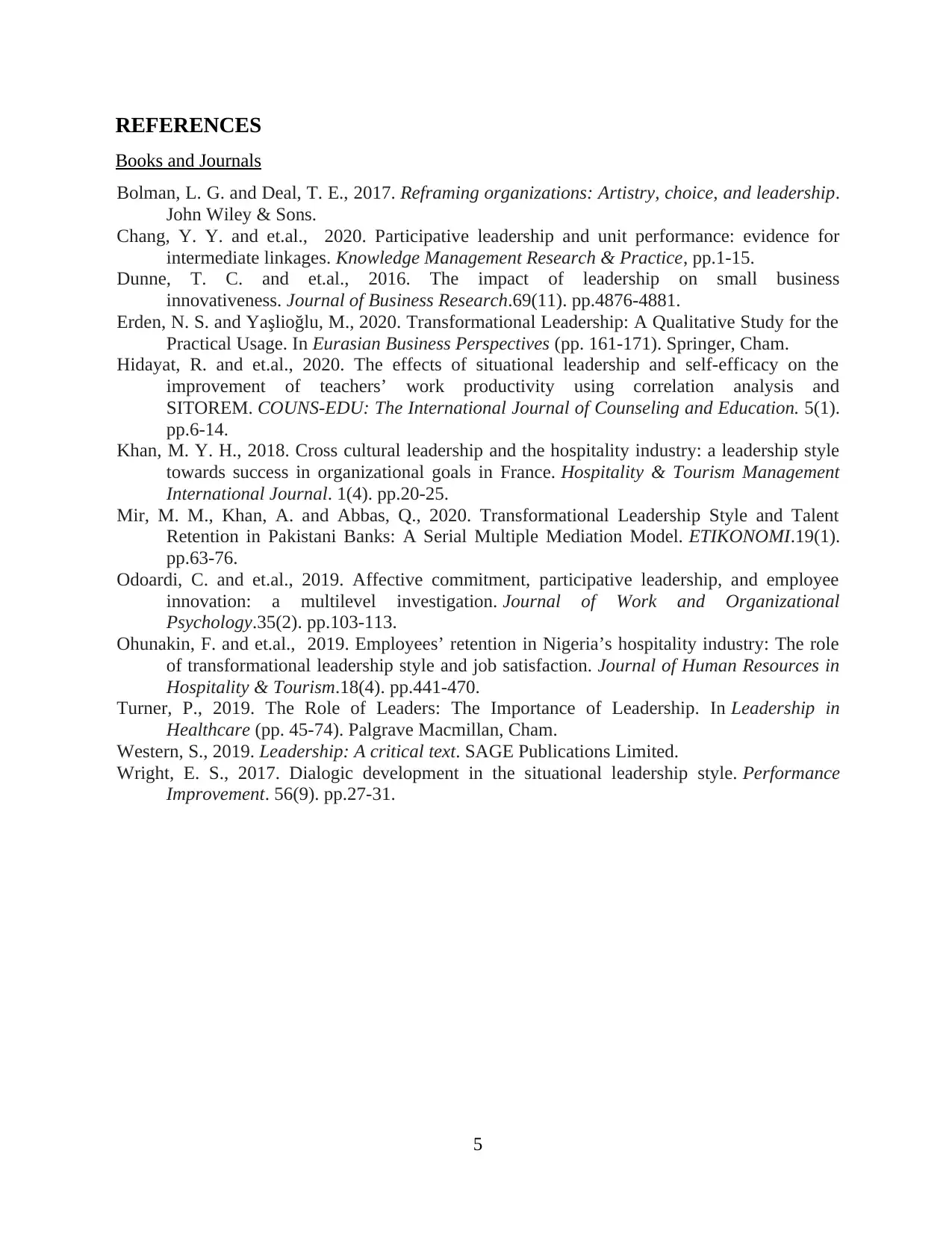
REFERENCES
Books and Journals
Bolman, L. G. and Deal, T. E., 2017. Reframing organizations: Artistry, choice, and leadership.
John Wiley & Sons.
Chang, Y. Y. and et.al., 2020. Participative leadership and unit performance: evidence for
intermediate linkages. Knowledge Management Research & Practice, pp.1-15.
Dunne, T. C. and et.al., 2016. The impact of leadership on small business
innovativeness. Journal of Business Research.69(11). pp.4876-4881.
Erden, N. S. and Yaşlioğlu, M., 2020. Transformational Leadership: A Qualitative Study for the
Practical Usage. In Eurasian Business Perspectives (pp. 161-171). Springer, Cham.
Hidayat, R. and et.al., 2020. The effects of situational leadership and self-efficacy on the
improvement of teachers’ work productivity using correlation analysis and
SITOREM. COUNS-EDU: The International Journal of Counseling and Education. 5(1).
pp.6-14.
Khan, M. Y. H., 2018. Cross cultural leadership and the hospitality industry: a leadership style
towards success in organizational goals in France. Hospitality & Tourism Management
International Journal. 1(4). pp.20-25.
Mir, M. M., Khan, A. and Abbas, Q., 2020. Transformational Leadership Style and Talent
Retention in Pakistani Banks: A Serial Multiple Mediation Model. ETIKONOMI.19(1).
pp.63-76.
Odoardi, C. and et.al., 2019. Affective commitment, participative leadership, and employee
innovation: a multilevel investigation. Journal of Work and Organizational
Psychology.35(2). pp.103-113.
Ohunakin, F. and et.al., 2019. Employees’ retention in Nigeria’s hospitality industry: The role
of transformational leadership style and job satisfaction. Journal of Human Resources in
Hospitality & Tourism.18(4). pp.441-470.
Turner, P., 2019. The Role of Leaders: The Importance of Leadership. In Leadership in
Healthcare (pp. 45-74). Palgrave Macmillan, Cham.
Western, S., 2019. Leadership: A critical text. SAGE Publications Limited.
Wright, E. S., 2017. Dialogic development in the situational leadership style. Performance
Improvement. 56(9). pp.27-31.
5
Books and Journals
Bolman, L. G. and Deal, T. E., 2017. Reframing organizations: Artistry, choice, and leadership.
John Wiley & Sons.
Chang, Y. Y. and et.al., 2020. Participative leadership and unit performance: evidence for
intermediate linkages. Knowledge Management Research & Practice, pp.1-15.
Dunne, T. C. and et.al., 2016. The impact of leadership on small business
innovativeness. Journal of Business Research.69(11). pp.4876-4881.
Erden, N. S. and Yaşlioğlu, M., 2020. Transformational Leadership: A Qualitative Study for the
Practical Usage. In Eurasian Business Perspectives (pp. 161-171). Springer, Cham.
Hidayat, R. and et.al., 2020. The effects of situational leadership and self-efficacy on the
improvement of teachers’ work productivity using correlation analysis and
SITOREM. COUNS-EDU: The International Journal of Counseling and Education. 5(1).
pp.6-14.
Khan, M. Y. H., 2018. Cross cultural leadership and the hospitality industry: a leadership style
towards success in organizational goals in France. Hospitality & Tourism Management
International Journal. 1(4). pp.20-25.
Mir, M. M., Khan, A. and Abbas, Q., 2020. Transformational Leadership Style and Talent
Retention in Pakistani Banks: A Serial Multiple Mediation Model. ETIKONOMI.19(1).
pp.63-76.
Odoardi, C. and et.al., 2019. Affective commitment, participative leadership, and employee
innovation: a multilevel investigation. Journal of Work and Organizational
Psychology.35(2). pp.103-113.
Ohunakin, F. and et.al., 2019. Employees’ retention in Nigeria’s hospitality industry: The role
of transformational leadership style and job satisfaction. Journal of Human Resources in
Hospitality & Tourism.18(4). pp.441-470.
Turner, P., 2019. The Role of Leaders: The Importance of Leadership. In Leadership in
Healthcare (pp. 45-74). Palgrave Macmillan, Cham.
Western, S., 2019. Leadership: A critical text. SAGE Publications Limited.
Wright, E. S., 2017. Dialogic development in the situational leadership style. Performance
Improvement. 56(9). pp.27-31.
5
1 out of 7
Related Documents
Your All-in-One AI-Powered Toolkit for Academic Success.
+13062052269
info@desklib.com
Available 24*7 on WhatsApp / Email
![[object Object]](/_next/static/media/star-bottom.7253800d.svg)
Unlock your academic potential
Copyright © 2020–2025 A2Z Services. All Rights Reserved. Developed and managed by ZUCOL.




